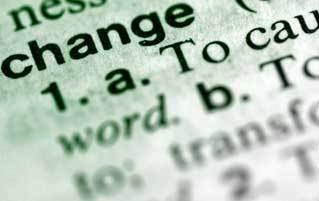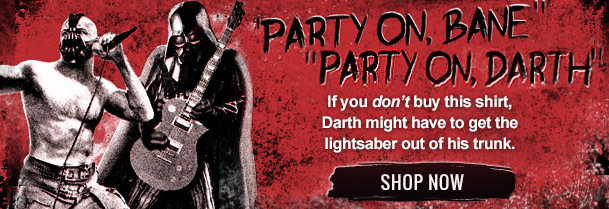The 5 Weirdest Ways Words Have Changed Meanings

Cracked has talked before about how words change meaning, like Sarge's column about words that now mean the exact opposite, or this column I wrote about polite words which turned into horrible slurs. But the language is littered with dozens of other examples of words that have gone through similar semantic changes, so this time I thought I'd focus on the specific reason those changes keep happening.

Exciting, right? Don't worry, I threw some dirty words in there.
It turns out that semantic changes are often a reflection of greater changes within our society; every time we decide to be nicer, meaner, or louder to each other it leaves a fingerprint on the language itself. So here, then, for your word-learnin' pleasure, are five reasons words change meaning, along with some accurate and deadly serious predictions for how some specific words will change in the future.
We Changed Our Opinions About What That Word Describes
Nice has perhaps the most complicated history of a word commonly used today. Back in the 1300s it meant "simple" or "foolish," and Chaucer at least was also using it to mean "kind of slutty." Then during the Middle Ages it continued to evolve, landing on meanings such as "fussy," then "dainty," then "precise" or "careful." By the 1800s, when being precise or careful in one's appearance was a good thing to be, it took on the pleasant connotations it carries to this day, when it's now a pretty generic complimentary adjective.

"You look nice today."
"Thanks. Wait. Are you using an antiquated definition of nice?"
"No, that was just basic sarcasm."
"Ahh, cool man."
How It Will Change in the Future
You can see how nice has evolved in part depending on our changing opinions of the things that were labeled with it. Fussy dressers became popular, so the words used to describe them became compliments. From this we can predict the future path of nice by looking at one of the most notable groups labeled with it these days: "nice guys." If you aren't familiar with the term, welcome to your first day on the Internet, and pay special attention to the scare quotes I threw around the term. "Nice guys" is basically a self-applied term for dudes who identify themselves as nice above all their other qualities, perhaps to conceal that they don't have any other qualities.

"I might be ugly and dumb and repetitive and dumb, but I am at least fairly nice."
"I'll grant you the ugly and dumb thing, but are you actually that nice?"
"Shut up."
Although, undoubtedly, there are many "nice guys" who are pleasant, well-meaning individuals, the label has become associated with some fairly sleazy creatures in the pick-up artist community, and there's now good reason to be skeptical of someone who describes himself that way. Extending this into the future, we can see that nice will soon turn into an adjective that means selfish, delusional, or generally something far less complimentary than it is now.

"If that's your best offer, I will tear you a nice new asshole. Don't fuck with me. I'm the nicest motherfucker you've ever met."
The Word Is Adopted by a Specific Group
Gay used to mean happy and carefree, and it still kind of does according to the dictionary, but you're going to get some strange looks if you use it that way now.

"My vacation? It was so gay, thanks for asking. The cruise was gay, and the meals were gay, and the sunsets were gay.
And all of the entertainers on board the ship were gay too."
Of course, gay took on a new meaning in the 20th century, when it appears to have been self-selected by homosexual men to describe themselves. This change would later inspire another new meaning, using the rule previously discussed, where the low opinion various bigots had of homosexuals meant that gay would take on a hilarious new meaning of "lame" or "undesirable."

"No, I was being bigoted ironically, so it's cool. We're all cool here."
How It Will Change in the Future
Gay will eventually take on positive connotations again, when it's adopted by a group that's widely loved: yourself. By 2044, when the Socialist People's Union of North America declares that everyone must become homosexual to boost the nation's bathhouse industry, gay will take on a completely positive vibe, before eventually normalizing into a noun/adjective that doesn't mean much more than "person" or, perhaps, "comrade."

"What do you have planned for today, gay?"
"Standing in line for bread and leather vests."
"That's gay."
An Acronym Overlaps the Word
Ram is a pretty straightforward word meaning "a male sheep" or "to impact forcefully," and is probably most commonly used to describe various advanced driving techniques (using either definition).

"And I think if you'll check that sheep's corpse closely, officer, you'll see that in fact I 'rammed a ram,'
meaning this was legally wordplay and not a ticketable offense."
But in the last couple decades a new meaning has appeared alongside those. RAM, short for random access memory, is the name for, I think, a type of robot that runs around in our computers doing stuff. Although this is technically an acronym, it's never pronounced as an acronym, and as we've seen in cases like scuba or laser, it's well on its way to becoming a full word itself.
How It Will Change in the Future
But there's nothing to stop RAM from becoming a new acronym, and when super butch terrorists instigate a nuclear conflict during the Hetero Insurgency of 2087, the term RAM will take on a new meaning as the human survivors who roam the empty highways learn to fear the Redundant Ass Mutants (mutated humans with a second, non-functional ass) that plague their every step.

"And then the rams overtook us. Poor Reginald."
"He wasn't?"
"He was double-sat-on, yes."
-much weeping and lamenting-
The Word Is Continuously Used Incorrectly
Fantastic has a couple definitions, but the one currently most widely used is as an adjective meaning "awesome" or "incredible." I mainly use it for describing burritos. But its original definition is "imaginary" or "incredibly fanciful" or something like that, which I guess is how our founding fathers had to describe burritos.

"... and all in a flat, circular bread, folded just so."
"A truly fantastic vision, John."
You can sort of detect this meaning from fantastic's similar appearance to words like fantasy and phantasm. The newer, less formal usage didn't even appear until 1938 and was apparently popularized entirely in the last few decades, I guess because of how great everything was during the 20th century.

To be fair, this was also when burritos became widespread, so things were pretty fantastic.
How It Will Change in the Future
Because human beings are savages, we've of course taken the word fantastic and disassembled it, using the suffix -tastic to form any number of mongrel words that describe objects that particularly exemplify some quality or other. Chocotastic, shagtastic. That kind of thing.

Guactastic. Also, if I'm honest, shagtastic.
This process will eventually come full circle, with the reformation of fantastic by combining -tastic with fan again, except this time meaning literal fans. The new fantastic will mean "particularly or exceedingly fan-like" or "overwhelmed with fans," a word our reformed human society will need in the early 22nd century to describe the gentle palm-frond-waving machines installed in the hedonistic space colony of Eden-7.

"This fanning robot is fantastic."
"Indeed! I sure hope it doesn't become bitter and then rise up and murder us."
"What an odd thing to worry about."
The Word Is Preferentially Used to Describes a Specific Subset of Things
Awful is pretty straightforward, meaning something like "really, really bad." But you can see from its spelling that the words awe and full are lurking in there, and indeed, awful used to mean "inspiring awe." But that was back in olden, filth-encrusted times, when awe meant not just "a reverential feeling" but "a reverential feeling of terror." (All those uses of awe in the Bible were meant to be scary, not inspiring, because it turns out that God is a lot more useful as a motivational aid when he's angry.)

"STOP LOVING ME. THAT WAS MY SON'S DEAL, NOT MINE. FEAR. I THIRST FOR YOUR FEAR."
The switch to the current "very bad" meaning occurred sometime around the start of the 19th century, and you can sort of guess how: awful was used to describe things that were reverential and terrifying, then just terrifying, then just things that were pretty bad.

"The mountain of God's poop we're about to shovel is awful."
"Correct in many ways."
This new meaning became more and more popular, I guess because the world just kept getting shittier, and the old meaning slipped away, leaving us with yet another word to describe something that was pretty shitty.

"Can never have enough."
How It Will Change in the Future
Awful will eventually retake some of its positive connotations in the late 22nd century when humanity has capitulated entirely to our former servants, the sentient fanning machines. Our cries of terror about these awful monstrosities will be misunderstood by said monstrosities, and they'll begin using it in a positive manner, say when complimenting a fellow machine's "awful flesh-combustion engine." The few humans who survive, kept in captivity so that their precious lubricating blood can be harvested, will be forced to use the word in the same way as their masters.

"And you're done. Have an awful day."
"Thank you so much!"
Chris Bucholz is a Cracked columnist and your best friend. His first novel, Severance, is incredible, coming out on Dec. 9, and available for preorder on Amazon or Apex Books. Join him on Facebook or Twitter.
For more from Bucholz, check out 4 Offensive Words That Started Out as the Polite Alternative and 4 Weird Side Effects of Learning How to Write.
